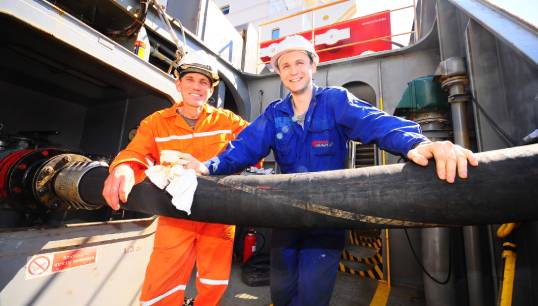
Nautilus members are urged to take part in a new survey launched by ISWAN on the International Day of the Seafarer, which seeks understand the impact that the rapid technological changes to decarbonise maritime are having on seafarers' job satisfaction and wellbeing at sea.
Seafarers are at the heart of this transformation to the zero-carbon global fleet of the future, and will need to rapidly adapt to operating new technological systems onboard and deal with the challenges of working with new and often potentially hazardous fuels.
The drive to decarbonise brings with it the enormous challenges of ensuring that seafarers have the training and skills that they need to manage new technologies and fuels safely.
A recent study commissioned by the Maritime Just Transition Task Force –which Nautilus is involved in as part of its campaigning for a Just Transition towards decarbonisation and digitalisation – found that up to 800,000 seafarers could require additional training to handle alternative fuels and technologies by the mid-2030s.
It is, however, crucial that seafarers' wellbeing is not overlooked amidst the urgent imperatives to upskill seafarers and to meet environmental targets. The rapid technological changes in maritime come at a time when seafarers have already faced unprecedented levels of challenge: the COVID-19 pandemic, the crew change crisis and the lack of shore leave crisis.
Chirag Bahri, ISWAN's international operations manager, said: 'This year, IMO's Day of the Seafarer focuses on seafarers' central role in protecting the marine environment. Nowhere is this more apparent than in the vital role seafarers play in implementing the wide-reaching changes that will be needed for the maritime industry to reach zero carbon.'
ISWAN's survey is open to all seafarers and shore-based staff. It can be accessed here.
Tags
More articles
Superyacht sector reports 125% rise in violence at sea among worrying trend of seafarer abuse
The superyacht industry has been flagged as an area of concern by seafarer helplines responding to a global increase in reports of abuse, bullying, harassment and discrimination (ABHD).
Stella Maris calls for maritime industry to step up its support for seafarers in war
Global maritime network Stella Maris says that as the war in Ukraine continues, there's an urgent need for the shipping industry to step up its support for Ukrainian seafarers and their families and work in partnership with the charity.
Charting a Just Transition not just a transition
Nautilus took its message of a Just Transition for seafarers to the leaders of the UK's £116 billion maritime sector this week as a sponsor of the fifth Mersey Maritime Exchange.
